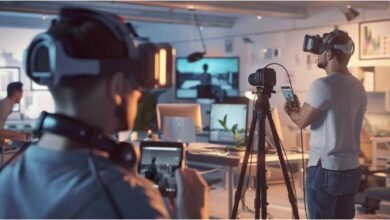The Impact of Social Media on Relationships and Human Connection

In the digital age, social media has become a pervasive force in our lives, influencing the way we communicate, interact, and form relationships. While it has revolutionized connectivity, providing unprecedented access to information and enabling global interaction, it has also fundamentally altered the dynamics of human connection. This article delves into the complex relationship between social media and human connection, examining both its positive and negative impacts on relationships.
The Evolution of Social Media and Its Role in Modern Relationships
Social media platforms such as Facebook, Instagram, Twitter, and TikTok have transformed the landscape of human interaction. These platforms allow individuals to share their lives, opinions, and experiences with a vast audience, often in real-time. This capability has bridged geographical divides, making it possible to maintain relationships across continents, reconnect with old friends, and form new connections with people who share similar interests or backgrounds.
The role of social media in relationships has evolved rapidly. Initially, these platforms were seen as tools for enhancing communication, allowing people to stay in touch more easily. Over time, however, the influence of social media has grown, affecting not only how we communicate but also how we perceive relationships. The constant flow of information and the ability to curate our online personas have created new norms for what relationships look like in the digital world. As a result, social media has become both a facilitator and a disruptor of human connection.
The Positive Impact of Social Media on Relationships
Social media has undeniably brought many positive changes to how we connect with others. One of the most significant benefits is the ability to maintain long-distance relationships. In the past, physical distance often led to the weakening of bonds, as communication was limited to phone calls and letters, which were often sporadic and time-consuming. Today, social media enables instant communication through messaging, video calls, and shared content, helping people stay connected regardless of their physical location.
Moreover, social media platforms have become spaces where people can express themselves more freely, sharing their thoughts, feelings, and experiences with a broader audience. This openness can lead to deeper connections, as individuals find others who resonate with their perspectives and values. Communities have formed around shared interests, providing support and companionship for those who might feel isolated in their offline lives.
Social media has also played a crucial role in raising awareness about important social issues, fostering a sense of global community. Movements such as #MeToo, Black Lives Matter, and climate change activism have gained momentum through social media, connecting people worldwide who are passionate about these causes. This collective action has strengthened bonds among individuals who may never have met otherwise, united by a common goal.
The Dark Side of Social Media: Erosion of Authentic Connection
Despite the numerous advantages, social media’s impact on relationships is not without its downsides. One of the most significant concerns is the erosion of authentic human connection. The curated nature of social media profiles often leads to a superficial understanding of others, as people tend to share only the highlights of their lives. This can create unrealistic expectations and foster a sense of inadequacy among users who compare themselves to these idealized versions of others.
Furthermore, the constant connectivity offered by social media can lead to a phenomenon known as “social media fatigue.” The pressure to stay updated, respond to messages, and engage with content can be overwhelming, leading to burnout and a sense of disconnection. In some cases, this can result in strained relationships, as individuals may feel neglected or undervalued when their partners or friends are more focused on their online interactions than on real-life connections.
Another negative impact of social media is its contribution to the rise of cyberbullying and online harassment. The anonymity provided by the internet allows individuals to engage in harmful behaviors with little accountability. This can damage relationships, as victims of online abuse may withdraw from social interactions, both online and offline, leading to isolation and loneliness.
Social Media and Romantic Relationships: A Double-Edged Sword
Romantic relationships, in particular, have been profoundly affected by social media. On one hand, these platforms can enhance intimacy by allowing couples to share their lives more openly and maintain communication even when apart. Social media can also be a valuable tool for relationship-building, as couples can engage in shared activities, such as posting photos, sending messages, and commenting on each other’s content.
However, social media can also introduce challenges in romantic relationships. The ease of communication with others can lead to jealousy and mistrust, as partners may feel insecure about their significant other’s interactions with others online. The constant exposure to other people’s seemingly perfect relationships can also create unrealistic expectations, leading to dissatisfaction and conflict in one’s own relationship.
Moreover, the public nature of social media can make it difficult to maintain privacy in a relationship. Arguments, breakups, and other personal matters can easily become public knowledge, leading to embarrassment and further strain on the relationship. In some cases, the desire for validation through likes, comments, and followers can become more important than the relationship itself, leading to a breakdown in communication and connection.
The Impact of Social Media on Family Dynamics
Social media has also had a significant impact on family relationships. On the positive side, it has made it easier for families to stay connected, especially in an increasingly mobile world where members may live far apart. Platforms like Facebook and WhatsApp have become essential tools for sharing updates, photos, and messages, helping families maintain a sense of closeness despite physical distance.
However, social media can also disrupt family dynamics. The rise of “sharenting,” where parents share extensive details about their children’s lives online, has raised concerns about privacy and consent. Children may feel uncomfortable with the amount of personal information shared about them without their permission, leading to tension within the family.
Additionally, the pervasive use of social media can create generational divides within families. Younger generations, who have grown up with social media, may have different attitudes towards privacy, communication, and relationships than older family members. This can lead to misunderstandings and conflicts, as each generation navigates the digital world differently.
Mitigating the Negative Effects of Social Media on Relationships
While social media has undoubtedly changed the way we connect with others, it is possible to mitigate its negative effects on relationships. One of the most important steps is to cultivate awareness and mindfulness in our use of social media. By recognizing the potential pitfalls of online interactions, individuals can make conscious choices about how they engage with these platforms.
Setting boundaries is crucial for maintaining healthy relationships in the digital age. This includes establishing limits on screen time, prioritizing face-to-face interactions, and being intentional about the content we consume and share online. By focusing on quality over quantity in our social media use, we can foster deeper, more meaningful connections with others.
Communication is another key factor in mitigating the negative impact of social media on relationships. Open and honest conversations about social media use, expectations, and boundaries can help prevent misunderstandings and build trust. Couples, families, and friends should regularly discuss how social media is affecting their relationships and work together to find a balance that works for everyone.
Finally, it is essential to remember that social media is just one tool for connecting with others. While it can be a valuable resource, it should not replace in-person interactions and genuine human connection. By prioritizing real-life relationships and making time for offline activities, individuals can ensure that their connections remain strong and meaningful.
Conclusion: Navigating Relationships in the Age of Social Media
The impact of social media on relationships and human connection is multifaceted, with both positive and negative aspects. While these platforms have made it easier to stay connected with others, they have also introduced new challenges that can strain relationships. By approaching social media with mindfulness, setting boundaries, and prioritizing authentic connection, individuals can navigate the digital landscape in a way that enhances rather than diminishes their relationships.
In the end, the key to maintaining strong relationships in the age of social media lies in finding a balance between the online and offline worlds. By recognizing the value of both and making conscious choices about how we engage with each, we can ensure that our connections remain deep, meaningful, and resilient in the face of the ever-evolving digital landscape.



